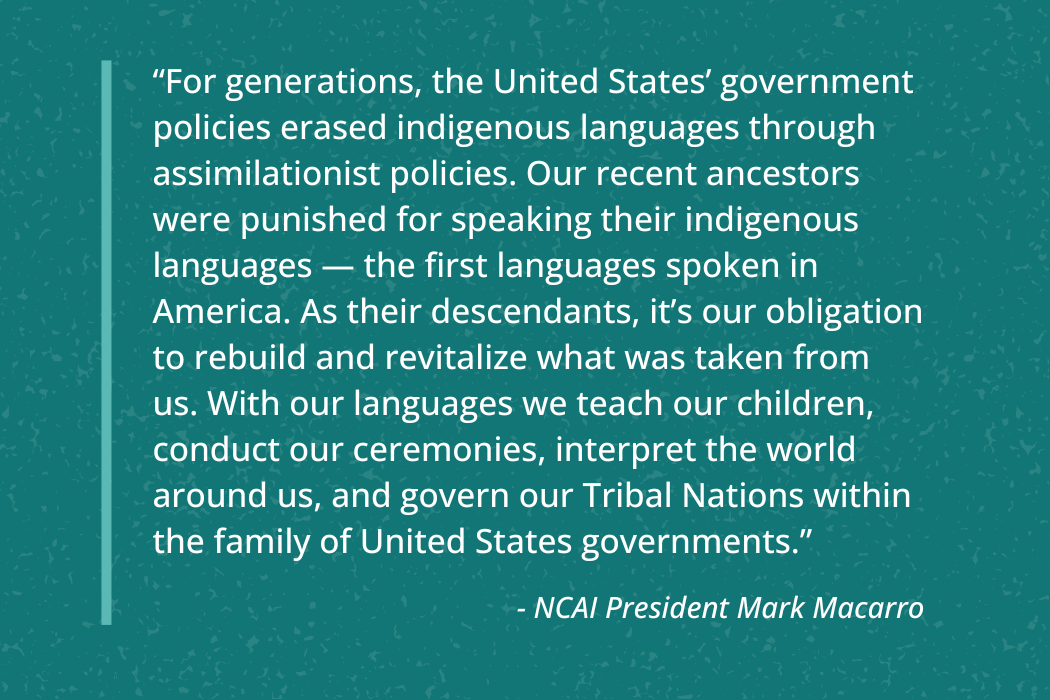
Washington, D.C. — As the oldest and largest representative organization of Tribal Nations, the National Congress of American Indians (NCAI) upholds the inherent sovereignty of tribal governments and the rights of their citizens and peoples to preserve and use their languages. NCAI is concerned by the efforts of various federal agencies to implement Executive Order (EO) 14224: Designating English as the Official Language of the United States.
On Monday, July 14, the Department of Justice released guidance on implementing EO 14224. EO 14224 revoked Executive Order 13166 (2000), which required federal agencies to provide meaningful access to services for individuals with limited English proficiency. With the rollback of these protections, tribal leaders have expressed concerns that their citizens who primarily speak Native languages are at greater risk of exclusion, harm, and discrimination.
“For generations, the United States’ government policies erased indigenous languages through assimilationist policies. Our recent ancestors were punished for speaking their indigenous languages — the first languages spoken in America. As their descendants, it’s our obligation to rebuild and revitalize what was taken from us. With our languages we teach our children, conduct our ceremonies, interpret the world around us, and govern our Tribal Nations within the family of United States governments,” said Mark Macarro, NCAI President. “We understand the importance of language as our tribal identity, and we won’t be diminished again for freely speaking our own languages. This is an issue of tribal sovereignty — and it’s our birthright.”
“An English‑only mandate does not strengthen America; it silences and excludes the first voices that shaped it,” said NCAI Executive Director Larry Wright, Jr. “Native languages played a vital role in American history by recording our treaties, guiding our governments, and protecting the nation’s very freedom. Native languages used by Native warrior codetalkers were instrumental in America’s victory in both World Wars. The complexity and expressiveness of these languages we made into unbreakable codes. Banning our Native languages from federal engagement would betray that legacy, violate the trust responsibility of the United States, and exclude Native peoples from contributing to the future of this nation and their Tribal Nations in ways we cannot begin to foresee.”
Since 1995, NCAI has opposed, through its resolution process, any proposed legislation, orders, or amendments that impose English as the official language of the United States or that hinder or harm the maintenance, preservation, and use of Native languages.
SD-95-013: Opposing HR 123, “English” as the Official Language
SD-95-080: Opposing the English-Only Legislation
PHX-96-029: Opposition to “English Only” Legislation
MRB-98-009: A Resolution Strongly Opposing An Election Ballot Requiring the State Of Alaska To Use English Only
NCAI calls on the Administration and Congress to exempt tribal governments and Native American languages from English-only mandates and fully consult with Tribal Nations on any federal actions that impact language rights and Tribal sovereignty.
###
About the National Congress of American Indians:
Founded in 1944, the National Congress of American Indians is the oldest, largest, and most representative American Indian and Alaska Native organization in the country. NCAI advocates on behalf of tribal governments and communities, promoting strong tribal-federal government-to-government policies and a better understanding among the general public regarding American Indian and Alaska Native governments, people, and rights. For more information, visit www.ncai.org.
